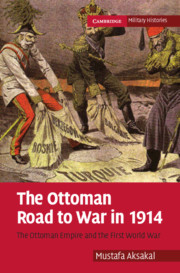Book contents
- Frontmatter
- Contents
- Acknowledgments
- Author's note
- Abbreviations
- Glossary
- Maps
- Introduction: pursuing sovereignty in the age of imperialism
- 1 The intellectual and emotional climate after the Balkan Wars
- 2 1914: war with Greece?
- 3 The Ottomans within the international order
- 4 The Great War as great opportunity: the Ottoman July Crisis
- 5 Tug of war: Penelope's game
- 6 Salvation through war?
- Conclusion: the decision for war remembered
- Bibliography
- Index
1 - The intellectual and emotional climate after the Balkan Wars
Published online by Cambridge University Press: 02 July 2009
- Frontmatter
- Contents
- Acknowledgments
- Author's note
- Abbreviations
- Glossary
- Maps
- Introduction: pursuing sovereignty in the age of imperialism
- 1 The intellectual and emotional climate after the Balkan Wars
- 2 1914: war with Greece?
- 3 The Ottomans within the international order
- 4 The Great War as great opportunity: the Ottoman July Crisis
- 5 Tug of war: Penelope's game
- 6 Salvation through war?
- Conclusion: the decision for war remembered
- Bibliography
- Index
Summary
When I contemplate all that Russia has done for centuries to bring about our destruction, and all that Britain has done during these last few years, then I consider this new crisis that has emerged to be a blessing. I believe that it is the Turks' [Türklerin] ultimate duty either to live like an honorable nation or to exit the stage of history gloriously.
Cemal Pasha, navy minister, November 2, 1914The Committee of Union and Progress resolved to enter the First World War on the side of Germany in the long shadow of Great Power intervention in the internal affairs of the Ottoman Empire. Publications addressing international questions reflected the deep conviction that the country's survival could be secured only on the battlefield. These arguments, to be sure, reflected elite thinking, and it is doubtful that they had made much headway among rural, let alone illiterate, populations by 1914. Nonetheless, Ottoman political writing after the two Balkan Wars of 1912 and 1913 focused on the mobilization of all segments of society in the defense of the empire. This mobilization required a comprehensive, or total, process, a process that could equip the people with patriotic passion and industry to fend off the dangers the empire faced. In books, journals, and newspapers appearing in Istanbul and elsewhere, writers and politicians referred to this process as hareket-i intibahiye, “the movement of awakening.” Military and political leaders depicted the empire as engaged in a final, life-or-death struggle.
- Type
- Chapter
- Information
- The Ottoman Road to War in 1914The Ottoman Empire and the First World War, pp. 19 - 41Publisher: Cambridge University PressPrint publication year: 2008
- 1
- Cited by



